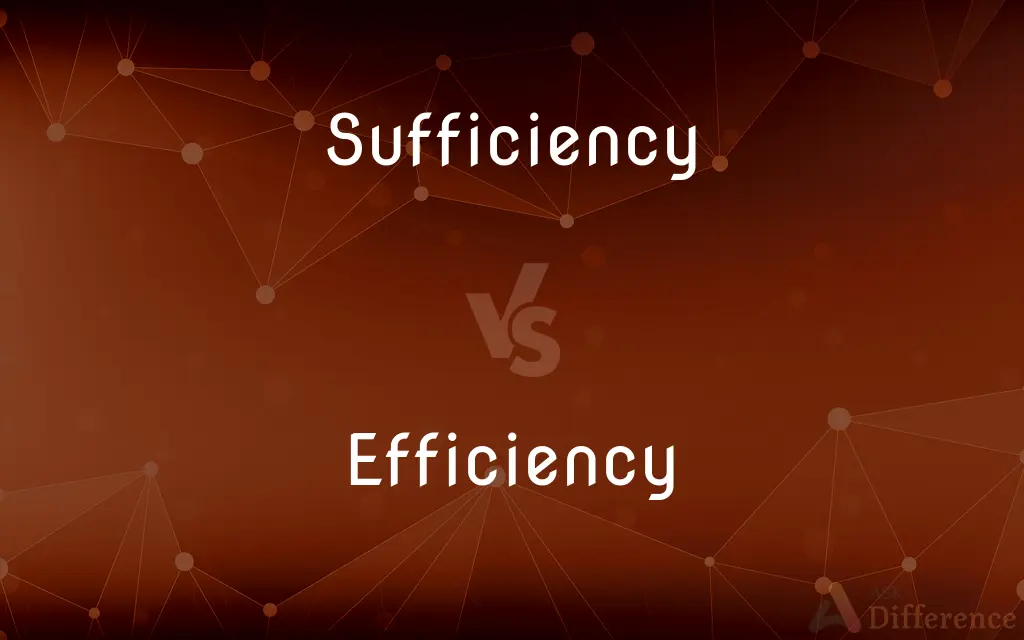Sufficiency vs. Efficiency — What's the Difference?
Edited by Tayyaba Rehman — By Maham Liaqat — Updated on March 26, 2024
Sufficiency is about meeting needs adequately, focusing on the amount required; efficiency is about maximizing output with minimum input, emphasizing performance and resource use.

Difference Between Sufficiency and Efficiency
Table of Contents
ADVERTISEMENT
Key Differences
Sufficiency revolves around the concept of having enough to meet specific needs or requirements. It's centered on adequacy and the absence of excess or deficiency. On the other hand, efficiency deals with the relationship between inputs and outputs, aiming to minimize the former while maximizing the latter, often in terms of time, energy, or resources.
While sufficiency prioritizes the adequacy of the outcome, ensuring that needs are directly met without overproduction, efficiency focuses on the process, seeking the most effective methods to achieve a goal with the least waste. This means that something can be sufficient without being efficient, and vice versa.
Sufficiency often involves a subjective assessment of what is "enough," varying significantly based on individual or societal standards. Conversely, efficiency is more objective, usually measurable through quantifiable benchmarks or ratios that compare input versus output.
In practice, sufficiency can lead to the conservation of resources by avoiding overproduction or excess consumption. Efficiency, however, optimizes the use of available resources, potentially leading to sustainability if it reduces overall resource consumption.
A sufficiency approach might prioritize local resources and capabilities to meet local needs, emphasizing community and resilience. Efficiency, however, often seeks global optimization, sometimes at the cost of local adequacy or sustainability.
ADVERTISEMENT
Comparison Chart
Focus
Adequacy of outcome
Optimization of process
Measure
Subjective assessment of "enough"
Objective benchmarks (input vs. output)
Outcome
Meeting needs without excess or deficiency
Maximum output with minimum input
Resource Conservation
Can lead to conservation by avoiding excess
Optimizes use, potentially enhancing sustainability
Application Perspective
Often local, based on immediate needs
Usually global, seeking broader optimization
Compare with Definitions
Sufficiency
The state of being sufficient or enough.
His income reached a level of sufficiency that allowed for comfortable living.
Efficiency
Ability to accomplish something with the least waste of time and effort.
Her efficiency in planning allowed the event to run smoothly.
Sufficiency
Adequacy to meet needs or requirements.
The pantry’s sufficiency of supplies lasted through the winter.
Efficiency
The ratio of the output to the input of any system.
Modern engines are designed for greater fuel efficiency.
Sufficiency
Enough to meet the circumstances or needs.
The emergency kit provides sufficiency in case of a power outage.
Efficiency
Effective operation as measured by a comparison of production with cost.
The factory’s efficiency has improved after the upgrade.
Sufficiency
The condition of having adequate resources.
The region’s water sufficiency is vital for its agriculture.
Efficiency
The quality of being able to do a task successfully, without wasting time or energy.
The worker’s efficiency was evident in his swift completion of tasks.
Sufficiency
A level of quality that satisfies basic requirements.
The apartment offers a sufficiency of amenities for its residents.
Efficiency
The state of achieving maximum productivity with minimum wasted effort or expense.
The new software improves the team’s efficiency significantly.
Sufficiency
The condition or quality of being sufficient
Questioned the sufficiency of the budget.
Efficiency
Efficiency is the (often measurable) ability to avoid wasting materials, energy, efforts, money, and time in doing something or in producing a desired result. In a more general sense, it is the ability to do things well, successfully, and without waste.
Sufficiency
An adequate amount or quantity
A sufficiency of clean water.
Efficiency
The quality or property of being efficient.
Sufficiency
Adequate means to live in modest comfort.
Efficiency
The degree to which this quality is exercised
The program was implemented with great efficiency and speed.
Sufficiency
(uncountable) The quality or condition of being sufficient.
Efficiency
The ratio of the effective or useful output to the total input in any system.
Sufficiency
(countable) An adequate amount.
Efficiency
The ratio of the energy delivered by a machine to the energy supplied for its operation.
Sufficiency
The quality or state of being sufficient, or adequate to the end proposed; adequacy.
His sufficiency is such that he bestows and possesses, his plenty being unexhausted.
Efficiency
An efficiency apartment.
Sufficiency
Qualification for any purpose; ability; capacity.
A substitute or most allowed sufficiency.
I am not so confident of my own sufficiency as not willingly to admit the counsel of others.
Efficiency
The extent to which time is well used for the intended task.
The efficiency of the planning department is deplorable.
Sufficiency
Adequate substance or means; competence.
Efficiency
(dated) The quality of producing an effect or effects.
Sufficiency
Supply equal to wants; ample stock or fund.
Efficiency
The extent to which a resource is used for the intended purpose; the ratio of useful work to energy expended.
The efficiency of this loudspeaker is 40%.
Sufficiency
Conceit; self-confidence; self-sufficiency.
Sufficiency is a compound of vanity and ignorance.
Efficiency
(US) A one-room apartment.
I have an efficiency available June through July.
Fully-furnished efficiencies
Sufficiency
Sufficient resources to provide comfort and meet obligations;
Her father questioned the young suitor's sufficiency
Efficiency
The ratio of the output to the input of any system
Sufficiency
An adequate quantity; a quantity that is large enough to achieve a purpose;
Enough is as good as a feast
There is more than a sufficiency of lawyers in this country
Efficiency
Skillfulness in avoiding wasted time and effort;
She did the work with great efficiency
Sufficiency
The quality of being sufficient for the end in view;
He questioned the sufficiency of human intelligence
Common Curiosities
What is sufficiency?
Sufficiency is the condition of having enough to meet one’s needs or requirements.
Is it possible to achieve both sufficiency and efficiency?
Achieving both sufficiency and efficiency is ideal, ensuring needs are met without waste, though it requires careful planning and management.
What is efficiency?
Efficiency refers to the ability to achieve a goal or task with the least possible waste of resources and time.
Can a process be efficient but not sufficient?
Yes, a process can be efficient in resource use but may not provide enough output to meet all needs, thus lacking sufficiency.
Can efficiency lead to overconsumption?
While efficiency optimizes resource use, it can sometimes encourage overconsumption by making products and services more accessible.
Does sufficiency always mean using less?
Sufficiency means using enough to meet needs, which sometimes involves using less but can also mean using resources more wisely.
How do cultural perceptions of sufficiency vary?
Cultural perceptions of what constitutes sufficiency can vary widely, reflecting different values, lifestyles, and economic conditions.
How does sufficiency relate to sustainability?
Sufficiency, by avoiding excess and waste, can contribute to sustainability by promoting the use of resources only as needed.
How can businesses achieve efficiency?
Businesses can achieve efficiency through process optimization, technology upgrades, and effective management practices.
How do sufficiency and efficiency differ in their application?
Sufficiency focuses on meeting needs adequately, whereas efficiency emphasizes the optimal use of resources to achieve an outcome.
Is technological advancement always beneficial for efficiency?
Technological advancement often enhances efficiency, but its benefits can be offset by increased consumption or resource use if not managed responsibly.
What role does efficiency play in economic growth?
Efficiency drives economic growth by enabling more to be produced with fewer resources, increasing productivity.
What is the impact of efficiency on resource conservation?
Efficiency can significantly impact resource conservation by reducing the amount of resources needed for production and consumption.
How does sufficiency impact quality of life?
Sufficiency ensures basic needs are met, which is fundamental for a good quality of life, although it doesn’t always imply luxury or excess.
Why is efficiency important in energy use?
Efficiency in energy use reduces waste, lowers costs, and minimizes environmental impact, making it crucial for sustainability.
Share Your Discovery

Previous Comparison
Celsius vs. Centigrade
Next Comparison
Interactiveness vs. InteractivityAuthor Spotlight
Written by
Maham LiaqatEdited by
Tayyaba RehmanTayyaba Rehman is a distinguished writer, currently serving as a primary contributor to askdifference.com. As a researcher in semantics and etymology, Tayyaba's passion for the complexity of languages and their distinctions has found a perfect home on the platform. Tayyaba delves into the intricacies of language, distinguishing between commonly confused words and phrases, thereby providing clarity for readers worldwide.
















































